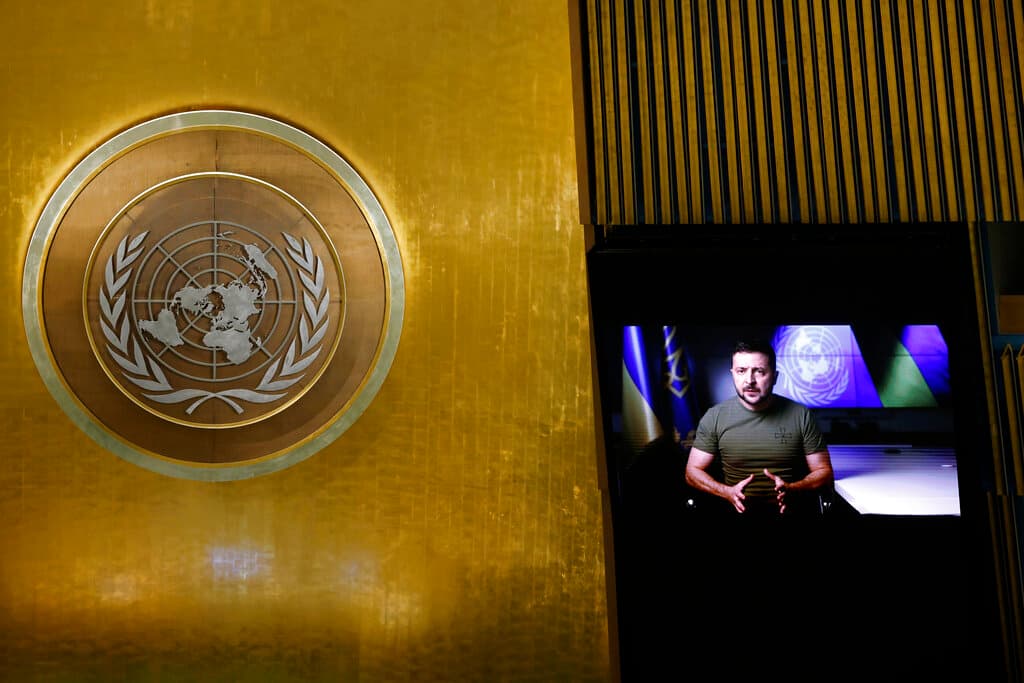Zelensky Is Man of the Hour at UN Gathering, Even Though He Couldn’t Attend
The most heartfelt standing ovation at the General Assembly is for the Ukrainian leader, who needed to win a procedural vote to address the crowd from Kyiv. Guess which six countries joined Russia in opposing the move.

The longest, most enthusiastic, and most heartfelt standing ovation for any speaker at this year’s United Nations General Assembly was reserved for a man who wasn’t on the premises: President Zelensky of Ukraine.
Clad in his customary olive-green T-shirt and backed by the country’s flag, Mr. Zelensky addressed the gathering from his Kyiv office — a feat that is not as easy to accomplish as it may sound. A special procedural vote was needed to allow the unprecedented remote speech.
To demonstrate the global support for his war of defense, Mr. Zelensky said that the procedural vote was “not only about the format, it was a vote about principles.”
Only seven countries voted against the delivery of his videotaped speech, Mr. Zelensky noted, and he named them: “Belarus, Cuba, North Korea, Eritrea, Nicaragua, Russia, and Syria. Seven. Seven who are afraid of a video address.” That 101 countries voted in favor of his appearance “means that peace will prevail over any aggression,” he added.
During his speech, Mr. Zelensky presented a five-point plan to end Moscow’s war. His plan, of course, is very unlikely to be accepted by Russia. President Putin announced today that he is ready to escalate the war by mobilizing Russian reserve units, and also darkly hinted at the use of nuclear weapons if Moscow doesn’t get its way.
Mr. Zelensky’s peace plan outline relies heavily on payback for Russia’s invasion of Ukraine. A “crime was committed, and Ukraine demands punishment,” he said, and then invoked the great author Fyodor Dostoyevsky: “This is a formula of crime and punishment, which is already known to the Russians.”
Mr. Zelensky dismissed the idea of peace talks prior to returning the Ukrainian flag to all parts of the country. The Russians “talk about talks, but announce military mobilization. They talk about talks but announce pseudo referendums in the occupied territories.”
Appealing to Europeans and the rest of the world, Mr. Zelensky sought to universalize his plight. The threat to use nuclear weapons, he said, “has become the rule, not the exception for Russian propagandists.” On the eve of the gathering in New York, he added, “Russia fired missiles at the south Ukraine nuclear plant.”
The damage to the nuclear plant at Zaporizhzhya, Europe’s largest non-military facility, “makes all of you a target,” he said. “Russian radiation blackmailing is something that should concern each and every one of you, because none of you will find a vaccine against radiation sickness.”
Mr. Zelensky also warned against Russia’s use of its oil and gas to blackmail Europe, and said a major food crisis around the world has resulted from the Kremlin’s prevention of Ukrainian grain exports.
Earlier in the day, President Biden dedicated much of his UN address to the crisis in Ukraine. Right off the bat, he said that “our world has experienced great upheaval: a growing crisis in food insecurity; record heat, floods, and droughts; Covid-19; inflation; and a brutal, needless war — a war chosen by one man, to be very blunt.”
President Putin “claims he had to act because Russia was threatened,” Mr. Biden said, “but no one threatened Russia, and no one other than Russia sought conflict. In fact, we warned it was coming. And with many of you, we worked to try to avert it.”
While he may have exaggerated his pre-war prevention measures, Mr. Biden in fact mobilized world leaders to be more assertive than they were in opposing the Russian aggression. Also, America has supplied Ukraine with more arms, by far, than any other country.
Yet, no one has united the globe around this fight more than Mr. Zelensky. In today’s speech, he said that he has delivered his five-point plan to key world leaders, and offered it as a blueprint for “real UN reform,” which would prevent future wars, rather than dealing with wars that have started.
While today’s standing ovation for the man in the olive-colored T-shirt may soon fade, it would be foolhardy to bet against Mr. Zelensky. He has shown that with his leadership, a small country can stand up to a neighbor that was once considered a top military power. He has the potential to fix ailing global institutions as well.

